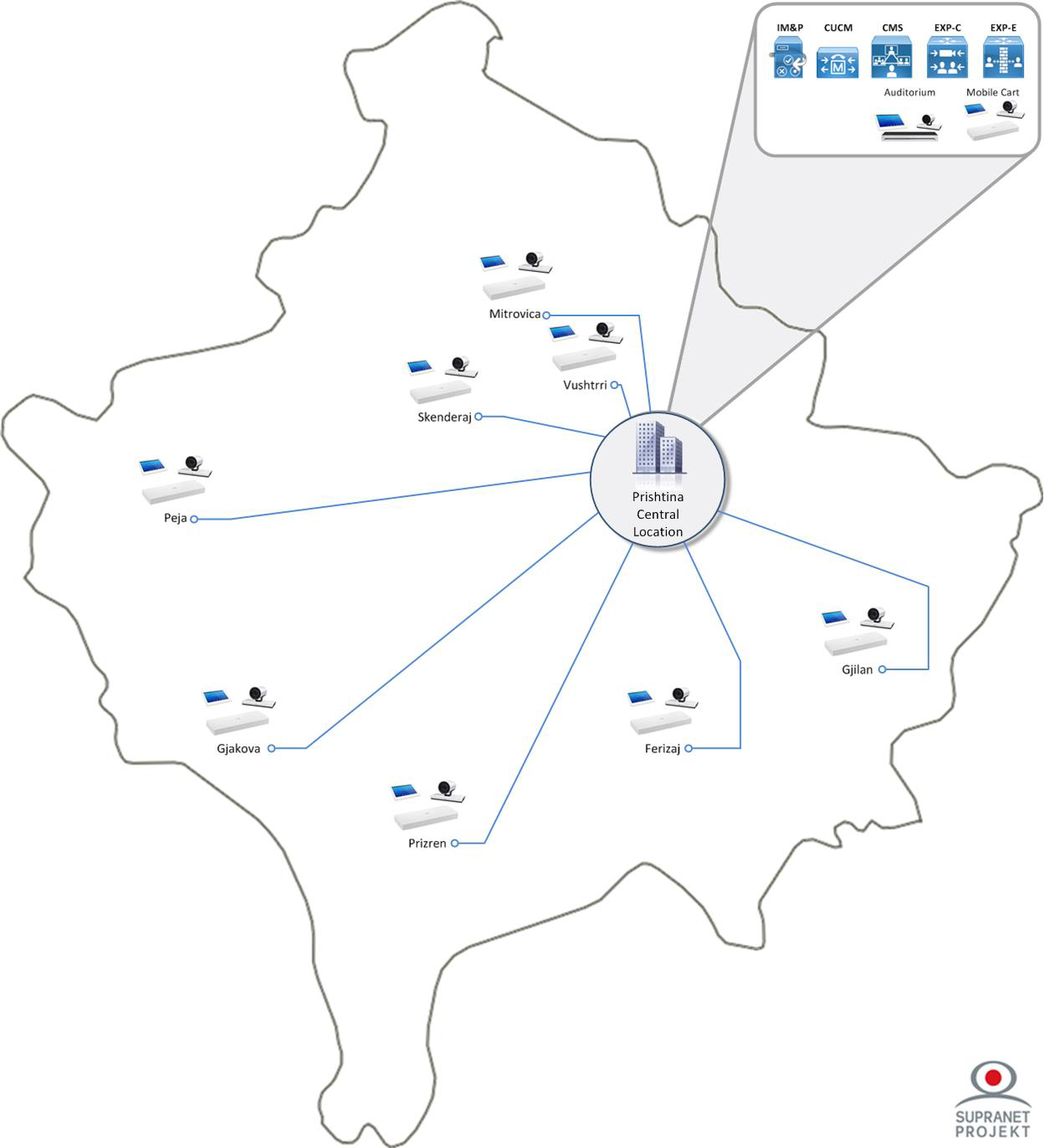Telemedicine Project in Kosova was established and inaugurated in 2002, with the aim to enhance healthcare access and services by leveraging technology, as country came out brutal war and healthcare facilities destruction. The idea to create the Telemedicine Project of Kosova and the International Virtual e-Hospital Network of Kosova, was presented at a G8-Meeting, in Berlin, May 4-5, 2000, by Dr. Rifat Latifi, while Assistant Professor of Surgery at Virginia Commonwealth University, in Richmond, Virginia, during the presentation, the “The anatomy of war and destruction of Kosova: The alumni view on reconstruction of healthcare in Kosova”. Following wide spread acceptance by many countries and institutions around the world, the idea of creating a virtual e-hospital in Kosova became a reality. To ensure the creation of a telemedicine center and realization of the project in Kosova, the Telemedicine Association of Kosova was created in Prishtina, September 30, 2000. On February 2nd, 2001, a Memorandum of Understanding (MOU) for the implementation of TPK was signed between all stakeholders of the health sector in Kosova. After extensive preparation, with the funding from the European Agency for Reconstruction, the Telemedicine Center of Kosova (TCK) was inaugurated on December 10, 2002, making way for the official beginning of the first phase of development of the TPK. This historical moment for Kosova and for the Balkan countries received extensive media coverage locally and abroad. The Telemedicine Center of Kosova (TCK) is a state-of-the-art telemedicine center, the best in the Balkan and southeastern Europe. As such TCK is providing basic foundations for development of educational medical programs within the Kosova’s medical system; as well it is establishing the standards of regional and international consultations and collaboration in the Balkan Peninsula. Furthermore, it is providing a solid basis for creation of human capacities that will lead and implement telemedicine program in the nine regional telemedicine centers of Kosova, for many years and decades to come, and has been reported on many research publications, books and book chapters.
1. Teleconsultations: Teleconsultations play a vital role in Kosovo’s telemedicine initiatives. Through videoconferencing or other digital platforms, patients can remotely connect with healthcare professionals, receive medical advice, discuss symptoms, and seek necessary guidance. Teleconsultations eliminate the need for physical visits, particularly helpful for patients in remote areas or those facing mobility challenges.
- Electronic Health Records (EHR): Implementing electronic health records is an essential component of telemedicine in Kosova. By digitizing patient data, medical histories, and test results, healthcare providers can securely access and share information for better diagnosis and treatment decisions. EHRs also facilitate remote consultations, as medical records are readily available to healthcare professionals during telemedicine encounters.
- Specialist Referrals: Telemedicine provides a means for primary care physicians in Kosova to remotely consult with specialists. By connecting through telecommunication tools, primary care providers can seek expert advice, discuss complex cases, and determine the need for specialist involvement. This helps optimize patient care and reduces the need for unnecessary travel for consultations.
- Remote Monitoring: Telemedicine programs in Kosova can include patient monitoring for chronic conditions. With the use of connected monitoring devices, patients can measure and share vital signs and health data with healthcare providers from their homes. Remote monitoring enables proactive healthcare management and timely interventions when necessary.
- Mobile Applications: Mobile applications have been utilized to support telemedicine services in Kosovo. These apps allow patients to schedule appointments, access healthcare information, and communicate with healthcare providers. Mobile applications can also integrate features like medication reminders, symptom tracking, and access to educational resources.
- Regulatory Framework: Kosova has been working on establishing a regulatory framework for telemedicine. This includes developing guidelines and regulations to ensure patient privacy, data security, and standardization of telemedicine practices. Clear policies help govern the ethical and legal aspects of telemedicine in the country.
It is important to note that the specific implementation and extent of telemedicine in Kosovo may vary, and there may be ongoing developments in the field. For the most accurate and up-to-date information, it is advisable to refer to official sources such as the Ministry of Health or local healthcare providers involved in telemedicine services in Kosova.
- Latifi R. International virtual e-hospital: the Balkans journey. Stud Health Technol Inform. 2008; 131:3-20. PMID: 18305319.
2.Latifi R. Instead of a prologue. Establishing telemedicine in the Balkans: from Berlin to Prishtina via Mars–a personal journey. Stud Health Technol Inform. 2004; 104:8-21. PMID: 15747959.
- Latifi R, Merrell RC, Doarn CR, Hadeed GJ, Bekteshi F, Lecaj I, Boucha K, Hajdari F, Hoxha A, Koshi D, de Leonni Stanonik M, Berisha B, Novoberdaliu K, Imeri A, Weinstein RS. “Initiate-build-operate-transfer”–a strategy for establishing sustainable telemedicine programs in developing countries: initial lessons from the Balkans. Telemed J E Health. 2009 Dec;15(10):956-69. doi: 10.1089/tmj.2009.0084. PMID: 19832055.
- Latifi K, Lecaj I, Bekteshi F, Dasho E, Doarn CR, Merrell RC, Latifi R. Cost-benefit analysis on the use of telemedicine program of Kosova for continuous medical education: a sustainable and efficient model to rebuild medical systems in developing countries. Telemed J E Health. 2011 Dec;17(10):757-62. doi: 10.1089/tmj.2011.0102. Epub 2011 Oct 19. PMID: 22011053.
- Latifi R, Muja S, Bekteshi F, Reinicke M. Use of information technology to improve quality of healthcare: Kosova’s telemedicine project and international virtual e-hospital as an example. Stud Health Technol Inform. 2004; 104:159-67. PMID: 15747975.
- Latifi R, Muja S, Bekteshi F, Merrell RC. The role of telemedicine and information technology in the redevelopment of medical systems: The case of Kosova. Telemed J E Health. 2006 Jun;12(3):332-40. doi: 10.1089/tmj.2006.12.332. PMID: 16796501.
- Latifi R, Merrell RC, Doarn CR, Hadeed GJ, Bekteshi F, Lecaj I, Boucha K, Hajdari F, Hoxha A, Koshi D, de Leonni Stanonik M, Berisha B, Novoberdaliu K, Imeri A, Weinstein RS. “Initiate-build-operate-transfer”–a strategy for establishing sustainable telemedicine programs in developing countries: initial lessons from the Balkans. Telemed J E Health. 2009







